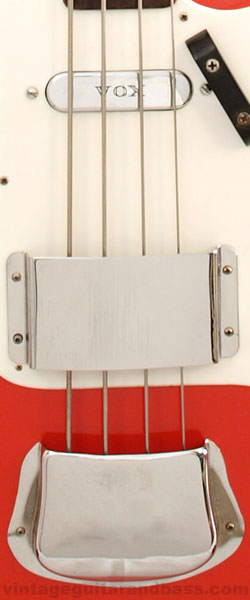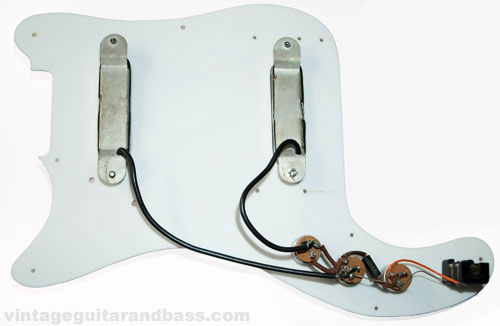1963 Vox Symphonic bass guitar (original) (raw)

1963 Vox Symphonic bass specifications
Model: 1963 Vox Symphonic bass
Scale: 34 1/2"
Body: Solid mahogany body. Total length 46 1/2", Body length 20", 13 1/2" wide, 1 3/4" thick.
Neck: Sycamore neck joins the body at 16th fret. Rosewood fingerboard with dot inlays. Adjustable truss rod. 20 frets. Width at nut 1 5/8". Attached to the body with four screws.
Hardware: Open gear individual tuning keys. 2 volume and 1 tone control
Weight: 4.14 kg
The Vox Symphonic bass was JMI's version of the Fender Precision, which they had already been distributing in the United Kingdom for some time in the early 1960s. The Vox has two pickups, compared to the Fender's one, but otherwise these guitars were very similar, having the same scale, construction, finishes and almost identical components. This bass certainly 'feels' very much like an early 60s Precision when played. All Vox Symphonic basses were produced at Vox's Dartford plant in the UK, and although small numbers were exported, the majority were sold in the UK.
 From the 1963 'Precision in Sound' brochure
From the 1963 'Precision in Sound' brochure
“An electric bass in the modern style. Two fine quality pick ups. It's smooth styling makes this instrument attractive and elegant. Full contoured body, slender reinforced adjustable neck. Independent fine tuning bridge, units are built into the tailpiece unit. Available in Red, White or Sunburst.”
The 1963 Symphonic bass still had Vox's standard chrome plated pickups (V1 single coils) - as used on the majority of Vox's early Dartford-produced models (at least at some point). But the body is a nice solid chunk of mahogany, weighing in at a little over 4 kg; broadly similar to a Fender Precision, and with Vox's version of Fender's Fiesta Red finish. This contrasts to the laminate wood bodies that were regularly used on Bassmaster and Clubman basses around this time. This example has the early slab-body, with shallow body contours, front and back, and the neck joining the body at the 16th fret (later the body would become more contoured and join the neck at the 15th fret, making an overall slightly shorter bass - compare with a 1966 Vox Symphonic).
Vox Symphonic - Vox's most expensive bass
The least-expensive Vox instruments of the time have a bad reputation, at least in comparison to imported guitars from the USA; but their higher-end guitars are far more substantial, with far superior components, much weightier bodies, and are altogether considerably better instruments. Naturally this is reflected in the retail price; the Symphonic bass was one of their most expensive models, three times the price of Vox's Bassmaster. For example, in February 1964, the Clubman bass was listed at £26 5s, the Bassmaster at £31 10s; whilst the Symphonic was £94 10s. Even the new Phantom was only £84. The Symphonic never sold well; it could be argued that it was simply overpriced in comparison to other solid body guitars available in the UK at the time.
1963 Vox Symphonic - a closer look
The 1963 bass shown here represents early Symphonic production, with Vox-branded chrome-covered V1 pickups and an un-branded bridge cover. Later examples had a large V on the cover, and although having the same scale, the bridge positioned further back on the body. This was due to the neck joining the body at the 15th rather than 16th fret.

The Vox Symphonic bass had two volume controls, one for each pickup, and just one tone control; unnumbered metal control knobs with red marker. Scratchplates varied over the course of production, but at this stage it was white single ply.

Vox Symphonic body detail, showing handrest, thumbrest and bridge cover. Note the lack of markings on the bridge cover - later Symphonic basses would have a stylised V embossed onto it. The original Symphonic hand rest is held in place with four screws.

Vox Symphonic bass with hand rest and bridge cover removed to show V1 pickups and bridge.

The V1 pickup covers did not always have the Vox logo embossed; some guitars had plain covers, others a mix. This bass, however, has both pickups with the Vox logo.

The bridge fitted to the Symphonic was similar in design to the Fender Precision it was emulating... and a much sturdier part than the bridges fitted to the Bassmaster or Clubman models produced by Vox at the same time.

Reverse view. The Symphonic neck is attached to the body via 4 bolts through the chrome-plated neckplate.

The Symphonic bass was fitted with a number of differing tuning keys; this early example has keys rather similar to the early sixties Precision. Note the oddly shaped G-tuner. The five digit serial number is stamped next to the E-tuner.

Front of the headstock, nut and string tree. The Symphonic headstock shape is not especially close to that of the Fender, being far more angular. Note also the original three-ply nut.

The headstock decals were not especially hard-wearing, and this is incomplete. Originally this had a Vox logo in green, the words 'Symphonic bass' (partially visible) JMI Dartford Kent. The second owner of this bass scraped off the 'Vox' logo in 1967 : "I wanted audiences to think it was a Fender".
The pots are British-made Morganite brand, two 1 mΩ volume and one 500 kΩ tone. The circuit is identical to that of a number of two-pickup Vox guitars and basses, Vox Shadow (2 pickup version), Vox Clubman (bass and guitar) etc.


Early examples of the Symphonic bass had a longer neck pocket than was necessary. The pocket actually extends right up to the neck pickup, yet for this bass, the end of the neck stops short of this point by some way. With the neck fitted, there is a small gap. Later examples had necks positioned so that their heel fills the whole pocket, making for a slightly shorter instrument overall. In order to keep the 34" scale, these basses have a bridge situated a small distance back from the example shown above.
Got an opinion on the contents of this page? Disagree with something written above? Please comment
